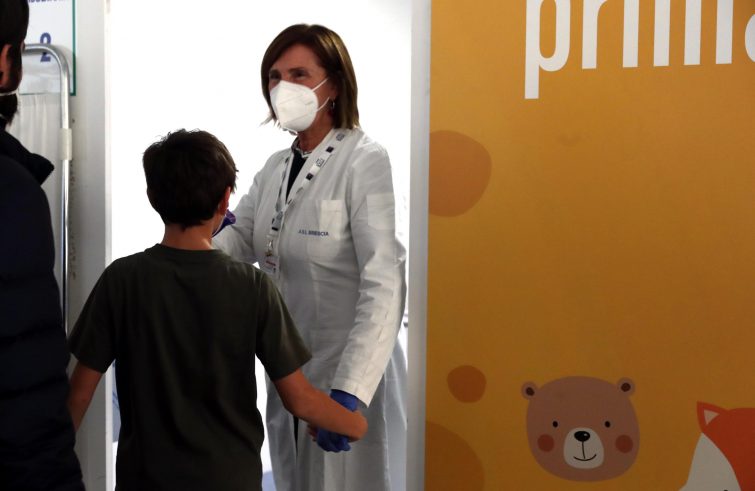
Children are facing a major challenge in the fight against COVID-19. The virus spreads among the unvaccinated population, which include the youngest, currently filling up hospitals. The world of adults only thought of them recently, giving the green light to vaccination just a month ago. Many must again face the discomfort of being quarantined, while the less fortunate are struggling in ICU. According to the director of the Emergency, Acceptance and General Paediatrics Ward at the Bambino Gesù Children’s Hospital in Rome, Dr Alberto Villani, the impacts of the disease on children have been a constant concern. He told SIR: “Many people are worried about unknown side effects of the vaccine but not about the fact that MIS-C, a terrible disease, could kill children six to eight weeks after a dormant infection.”
Dr Villani, what is the current situation of children hospitalised with Covid?
The numbers are rising again, with a total of 60 inpatients to date. ICU patients have also increased from 4 to 5.
The virus spreads fast amongst the unvaccinated population, which includes children.
Have you seen an increase in COVID-related psychological distress among children and adolescents?
Hospitalisation is always unpleasant, and in this situation it is all the more so.
Are you worried about the situation, notably the increase in hospitalised children?
I have always been.
Paediatricians have consistently been concerned about cases of Covid in children.
The figures are of course very small compared to those of adults, but we have been warning all along that a child could have serious problems. As early as May last year, the Bambino Gesù Hospital published a study reporting cases of children who had died from the infection.
We immediately tried to make it clear that MIS-C (Multisystem inflammatory syndrome – COVID, ed.’s note) was linked to SARS-Cov2.
Many people have been concerned about unknown side effects of the vaccine but not about the fact that a serious disease such as MIS-C, could kill children six to eight weeks after a dormant infection.
We have always been extremely concerned because 7% of infected children will develop Long Covid symptoms and because the impact of any disease that occurs in childhood affects the entire organism exponentially.
Some of the conditions will most likely occur after months or years. We would like everyone to be concerned about this. The damage done by unvaccinated individuals is to facilitate the spread of the virus, thereby affecting all age groups.
Schools have reopened today. Do you anticipate a new surge of infections?
Evidence shows that the rise in infections occurred when schools were closed. From a purely scientific angle, a study conducted by the Bambino Gesu Hospital shows that
COVID does not spread in schools.
As regards managing the situation, in terms of reducing the number of people placed in quarantine, an assessment must be made by the relevant authorities. For now, they have decided to leave them open.
It has been said that vaccinating children is a way to limit contagion, while the risks of the disease for this population bracket have been minimised.
There has been a great deal of confusion surrounding this issue.
Children must be vaccinated to protect themselves.
We have no foreknowledge of which child or young person will have a very serious outcome and even die.
What is the state of the trial of the vaccine for children aged between six months and five years?
I wouldn’t call it a trial. All approval processes – normally carried out for drugs and vaccines – are at a very advanced stage, so much so that authorisation is expected to come in already this spring. It must be repeated again and again that a vaccine that has worked so well in older adults and in teens and children will also work fine for young children. As paediatricians, we have consistently called for a vaccine.
However, for the future we must remember one thing: in the event of a pandemic, vaccines for children must be developed immediately without any delay.
It is becoming a pandemic of the unvaccinated and of children.
It currently is because they cannot be vaccinated. That’s different.
Has vaccination for children over 5 years of age started late in your opinion?
It might have. We should have called for increased emphasis on vaccination. Our hospital is in the front line with its dedicated hospital doctors. Health education is the best option, and it should have started immediately.
We had some impressive results in last year’s health education programme: parents and children had no reservations, but the problem arises when people are unaware, when there is ignorance.
Has the present situation affected other health services in your hospital?
Not at the moment, although this is thanks to organisational and readjustment processes that have nonetheless created difficulties. I would like those who thoughtlessly believe that not getting vaccinated is an individual choice to understand this. It’s completely wrong, it creates problems for everyone.
Is it possible for a new variant to emerge in the paediatric age group?
All viruses produce many variants over time, and some of these variants spread more easily and prevail over the others. The prevailing factor is the extent to which the virus spreads.
There are two pandemics: one is linked to Delta and the other to the spread of the Omicron variant. Are children more affected by Omicron?
We still lack the necessary data to answer that question. The latest official data in Italy indicate the spread of the Omicron variant at 15 and 30%. It is possible to imagine that this variant will eventually prevail, as is happening in other countries.








